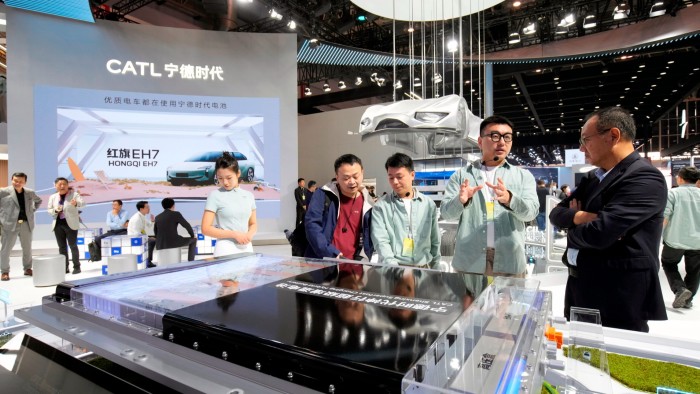Good morning. On today’s agenda:
-
China’s CATL expands in Europe
-
Who’s running South Korea?
-
The FT’s Business Book of the Year
CATL and Stellantis will build a €4.1bn lithium battery factory in Spain, boosting the European carmaker’s pivot to electric vehicles and expanding China’s manufacturing footprint on the continent.
The factory in Zaragoza, northeastern Spain, is scheduled to start production by late 2026 under a 50-50 joint venture between the world’s biggest battery maker and the fourth-largest carmaker, owner of the Peugeot, Jeep and Fiat brands.
Europe has tried to reduce its reliance on Chinese batteries by investing in developing the technology. But those efforts have stumbled, with its biggest battery hope Northvolt filing for Chapter 11 bankruptcy in the US.
The deal comes despite plans from Brussels to force Chinese companies to transfer intellectual property to European businesses in return for EU subsidies, as part of a tougher trade regime for clean technologies.
CATL, which is a key Tesla supplier, has been working to expand in Europe as tensions between Beijing and Washington threaten its growth plans in North America. Read more about the Chinese group’s deal with Stellantis.
Here’s what else we’re keeping tabs on today:
-
Chinese economy: The Central Economic Work Conference, the Chinese government’s annual economic policy meeting, begins in Beijing.
-
Economic data: The US reports November inflation data.
-
Forecasting 2025: Financial Times editor Roula Khalaf and other FT experts discuss their predictions for the world in 2025. Register here.
The FT has launched the India Business Briefing newsletter, a must-read for Indian professionals on business and policy in the world’s fastest-growing large economy. Sign up here if you’re a premium subscriber or upgrade your subscription. You can read the first edition of the newsletter here.
Five more top stories
1. Xi Jinping has pledged that China will meet its ambitious GDP growth target of 5 per cent this year and remain the engine of global economic expansion. The Chinese president’s comments came a day after the country’s leaders eased their monetary policy stance for the first time in 14 years and as Beijing steps up efforts to boost flagging investor confidence.
2. Evergrande’s liquidators are trying to sell an Airbus private jet that belonged to Hui Ka Yan, the collapsed property developer’s founder. Any successful sale of the plane — one of several markers of wealth amassed by Hui during the company’s boom years — would mark an early sign of progress by liquidators trying to return cash to investors that bought billions of dollars of the company’s bonds.
3. Russia is holding on to its key military bases in Syria, even as it pulls its forces back from smaller outposts in the country following the overthrow of its ally Bashar al-Assad. Satellite imagery showed no signs of a Russian withdrawal from the main naval and air bases it uses staging points for the Mediterranean and Africa.
-
More from Syria: Israel’s defence minister said the country wanted to create a “sterile defensive area” inside Syria after seizing territory and pounding military targets in the country following the toppling of the Assad regime.
4. Donald Trump has vowed to speed up regulatory approvals for investors spending $1bn or more in the US, a signal that he will address one of developers’ thorniest complaints when he takes office next month. Trump’s pledge reflects his plan to spur more domestic investments through deregulation rather than the tax credits and subsidies favoured under President Joe Biden.
5. Nippon Life is in talks to buy global life insurance rival Resolution Life for about $8.2bn, according to people close to the company. The acquisition would be the largest-ever overseas agreement by a Japanese insurer, and comes as an increasing number of the country’s financial services giants are considering deals abroad.
News in-depth
South Korean President Yoon Suk Yeol has been banned from travelling abroad and is under investigation for treason in the wake of last week’s failed martial law gambit. But he remains in office, baffling analysts and diplomats who wonder who is running the country. Asked by the FT who is charge of South Korea, a presidential spokesperson replied: “There is no official answer to that question.”
We’re also reading . . .
-
Trumpian world: The end of the US-led order is giving way to a kind of chaos that chimes with the president-elect’s preferences, writes Edward Luce.
-
‘A threshold has broken’: The alleged killer of an executive has drawn morbid admiration from people aggrieved with the US’s costly healthcare system.
-
Javier Milei: The libertarian president has stabilised a turbulent economy and kept the support of half the population, but big challenges loom for Argentina.
Chart of the day
Investors’ “relentless” appetite for juicy returns has triggered the biggest boom on Wall Street in complex — and often riskier — financial products since the lead-up to the global financial crisis in 2007. Transactions this year have forged bonds that are backed by income tied to the revenues generated by spicy chicken wings, data centres and music catalogues.
Business Book of the Year
Supremacy, Parmy Olson’s book exploring the rivalry between OpenAI founder Sam Altman and Demis Hassabis, the co-founder of Google DeepMind, has won the Financial Times and Schroders Business Book of the Year Award. FT editor and chair of the judging panel, Roula Khalaf, said the book “brilliantly frames the development of artificial intelligence”.
Read the full article here

